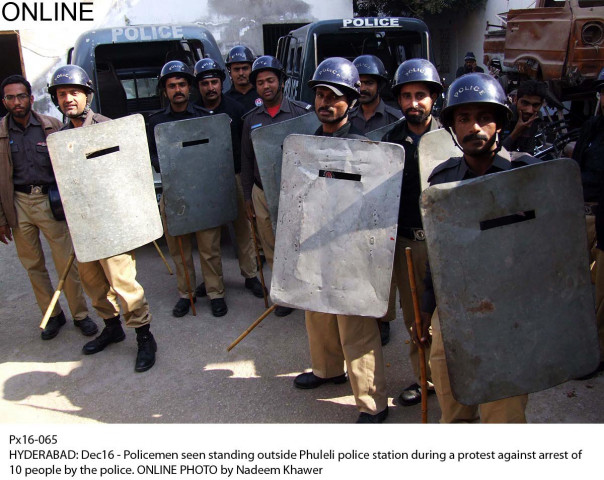Sluggish progression: Hyderabad police far from forensic policing standard of developed countries
LUMHS trains the third batch of policemen and Rangers and awards them certificates.

PHOTO: ONLINE
The third batch, comprising 53 police and Rangers trainees, at Liaquat University of Medical and Health Sciences (LUMHS) completed their training and received certificates at a ceremony on Tuesday. The 40 policemen who attended the programme ranked between inspector and ASI. They were chosen from both urban and rural areas.

During the one-month course, they were taught modern methods of investigation, exhumation, autopsy, deoxyribonucleic acid (DNA) testing, and preservation and collection of biological, trace and impression evidence from a crime scene. Among other skills, the examination of bodies of victims of mass disasters, which include bomb blasts, and sexual assault victims were also taught, according to Dr Akbar Qazi, the chairperson of the department of forensic medicine at LUMHS.
Vice-chancellor Dr Noshad A Shaikh offered further cooperation in the field to the police and the Rangers. He said that his university's forensic lab is the first in Sindh to have been officially declared a certified DNA-testing lab.
Addressing the ceremony, Hyderabad DIG Dr Sanaullah Abbasi admitted faults in the prevalent system of investigation and said that it is easily tampered with on account of several considerations. "But forensic evidence can't be tampered [with]," he said.
Notwithstanding the emphasis on the significance of this subject, the outcome of training of the first two batches of policemen — 15 received forensic training at LUMHS in May 2012 and 20 others in May 2014 — remains unknown. The DIG did not share how the imparted forensic skills have contributed to the traditional investigation methods of trained policemen nor were the trainers aware of them. "We believe that their crime investigation skills would have certainly improved but we haven't been monitoring them," said a source in the DIG office.
The trainers' perspective
The training mainly dealt with the forensic medicine component of this overarching subject. Forensic photography, sketching, video and audio recording, crime scene reconstruction and physical evidence collection, among other methods, were not part of it.
"To begin with, we teach them how to preserve and collect evidence from a crime scene and that they should wear gloves and cover their heads," Dr Pardeep Kumar and Dr Waheed Nahyon, who were part of Dr Qazi's team of police trainers, told The Express Tribune. "They also learned how to collect evidence from a sexual assault victim, prepare reports of minor injury cases, exhumation and DNA [sample] collection."
Dr Kumar said the trainees lacked knowledge of even the basic forensic practices. "The police have to collect all evidence from a crime scene for lab testing by forensic experts," he said. "But we all know how protocols for handling the crime scene are violated. Even the media's cameramen and photographers are allowed access. All of this distorts the evidences."
Published in The Express Tribune, May 27th, 2015.


















COMMENTS
Comments are moderated and generally will be posted if they are on-topic and not abusive.
For more information, please see our Comments FAQ